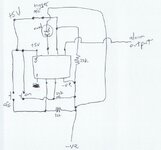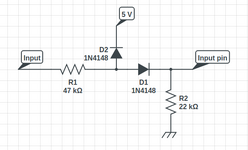wozzzzza
Member level 4

- Joined
- Dec 10, 2008
- Messages
- 76
- Helped
- 0
- Reputation
- 0
- Reaction score
- 5
- Trophy points
- 1,288
- Activity points
- 1,736
been out of electronics too long and ant work this one out now.
i want to build a circuit, an alarm circuit, that will toggle armed and unarmed with 2 separate high inputs, e.g. one input goes high for half a second to turn it on and another input goes high for half a second that turns it off. no matter how many times a high pulse is sent to the on input, the alarm will remain armed and vica versa.
another n/c input to trigger the alarm out for 5 seconds, so when this input is open circuit it will trigger the alarm output for 5 seconds only when the circuit is armed. after 5 seconds waits for another alarm input.
how can i build something like this easily??
i want to build a circuit, an alarm circuit, that will toggle armed and unarmed with 2 separate high inputs, e.g. one input goes high for half a second to turn it on and another input goes high for half a second that turns it off. no matter how many times a high pulse is sent to the on input, the alarm will remain armed and vica versa.
another n/c input to trigger the alarm out for 5 seconds, so when this input is open circuit it will trigger the alarm output for 5 seconds only when the circuit is armed. after 5 seconds waits for another alarm input.
how can i build something like this easily??
MODERATOR ACTION:
- Added relevant information on title
Last edited by a moderator:




